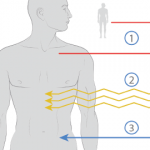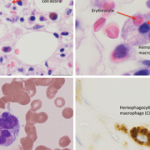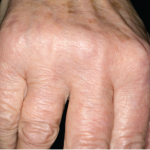NEW YORK (Reuters Health)—Tofacitinib begun two to three weeks after live zoster vaccination does not impair immunogenicity, and vaccination appears to be safe in patients with pre-existing varicella zoster virus (VZV) immunity, researchers report. Patients with rheumatoid arthritis (RA) are about twice as likely as healthy adults to develop herpes zoster, or shingles, and the…
Some Jobs Tied to Higher Risk of RA
(Reuters Health)—Workers exposed to airborne toxins may have an elevated risk of developing rheumatoid arthritis (RA), an immune system disorder that causes debilitating swelling and pain in the joints, a Swedish study suggests. Among men, bricklayers, concrete workers and electricians had at least twice the risk of RA they would have in certain other occupations,…

Osteoporosis Screening Is Underutilized Despite Recommendations
For years, guidelines from various organizations have recommended osteoporosis screening in women and men starting at a specific age or based on specific risk factors. Among these guidelines are those developed by the U.S. Preventive Services Task Force (USPSTF) that recommend universal osteoporosis screening for women 65 years of age and older and for targeted…

HSCT for Severe Autoimmune Diseases
Despite the innovations of new biologics and disease-modifying anti-rheumatic drugs, a large unmet need remains for patients with rheumatic autoimmune disease. Treatment remains limited for many conditions, including for conditions with a dim prognosis, such as systemic sclerosis.1 One promising treatment avenue is hematopoietic stem-cell transplantation (HSCT). Here, we provide background on HSCT for severe…

Rheumatology Drug Updates: Opana ER Painkiller Pulled from U.S. Market; Upadacitinib to Treat RA, and More
Opana ER Pulled from U.S. Market Last month, the U.S. Food and Drug Administration (FDA) asked Endo Pharmaceuticals to remove oxymorphone hydrochloride extended release (Opana ER) from the U.S. market due to public health consequences related to abuse. The agency has concerns that the risks presented by the treatment do not outweigh its benefits.1 On…

University of Nebraska Division of Rheumatology and Immunology Makes Education, Clinical Research Top Priorities
When it was created in 1982, the Division of Rheumatology and Immunology at the University of Nebraska Medical Center comprised one-and-a-half rheumatologists: its founder, Lynell W. Klassen, MD, MACR, and Gerald Moore, MD, who later received formal training at the NIH and now serves as senior associate dean for academic affairs. Thirty-five years later, the…

Fellows’ Forum Case Report: Hemophagocytic Lymphohistiocytosis
The patient was a 48-year-old woman who saw her primary care physician for a flu-like illness three months prior to admission. Her symptoms initially improved, but recurred one month later; she was treated symptomatically, and again symptoms resolved. Two months later, she presented to an outside facility’s emergency department with fever to 103ºF, with associated…

Aims Review Committee Helps Rheumatology Researchers Craft Grant Proposals
There you are, working steadily away on your next manuscript. The ideas are flowing. You’ve hit your stride. Nothing can stop you now—nothing, that is, except a colleague who shows up at your desk with a 20-page grant proposal. “Do you mind?” he asks. Across academia the problem is the same—too few hours in the…

Gut Microbe, Prevotella copri, Implicated in RA Pathogenesis
New research reinforces the hypothesis that the gut microbiome triggers mucosal and systemic immune responses in patients with rheumatoid arthritis. The research, published in Arthritis & Rheumatology May 2017, found that subgroups of patients with RA have differential immunoglobulin G (IgG) or IgA immune reactivity with Prevotella copri, an intestinal microbe that appears to be…

Effectiveness of Retinoic Acid, Hydroxychloroquine Examined for Hand OA
The Osteoarthritis Research Society International (OARSI) held the 2017 OARSI World Congress in Las Vegas, April 27–30. Below, we report on two of the sessions held. Retinoic Acid & Hand Osteoarthritis Retinoic acid is a vitamin A derivative and hormonal signaling molecule with a role in cartilage and skeletal development. Retinoic acid has complex function,…
- « Previous Page
- 1
- …
- 42
- 43
- 44
- 45
- 46
- …
- 125
- Next Page »